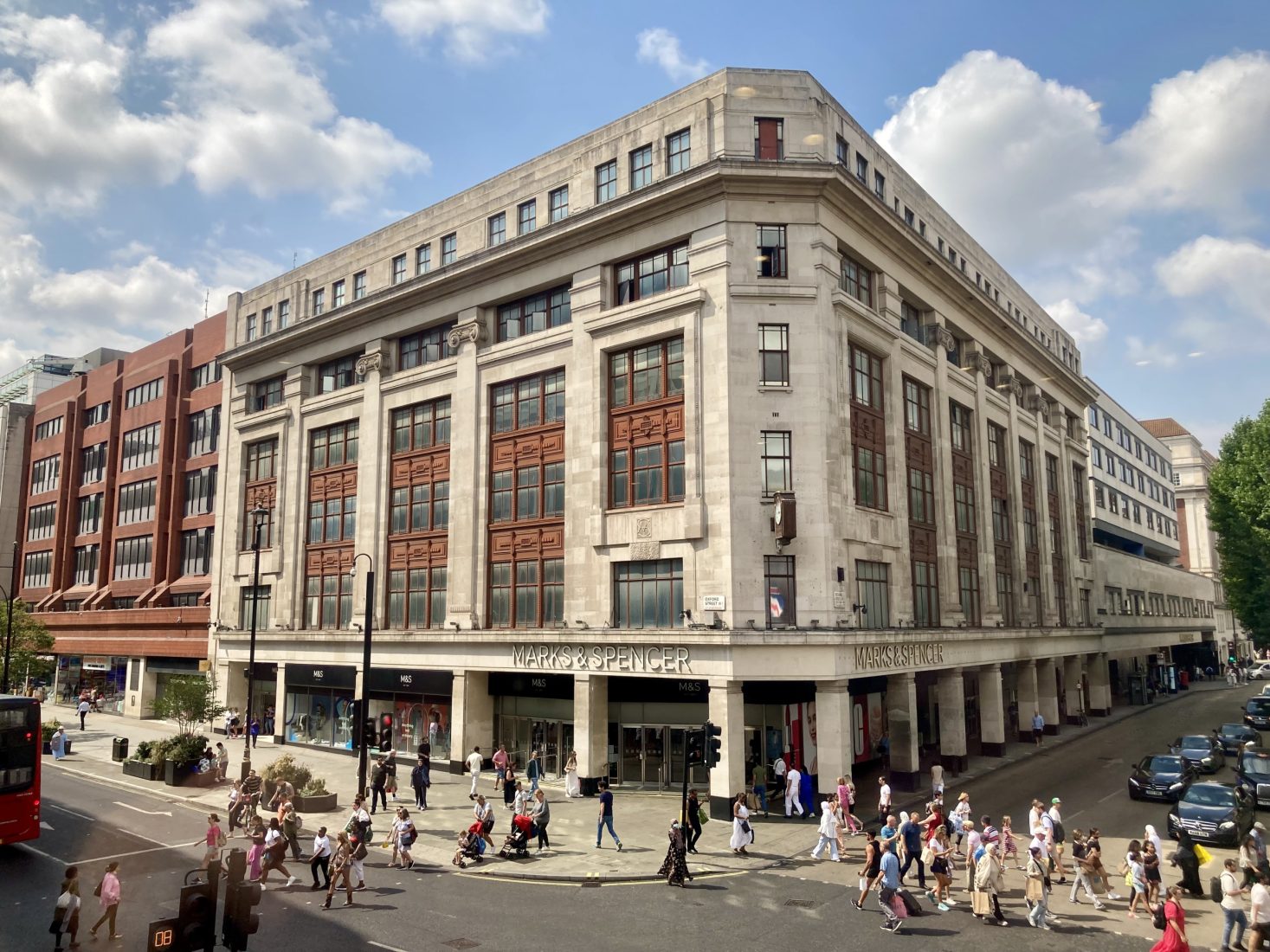The iconic British retailer, Marks and Spencer, has won a High Court legal battle against the government over their decision to reject the retailer’s planning application. The High Court ruled that the decision of the Levelling Up, Housing and Communities Secretary, Michael Gove, to reject the development of the M&S flagship store was unlawful. The planning permission appeal by M&S was therefore successful.
The case forms part of a debate about repurposing versus demolishing commercial buildings in the UK. Find out why the government were overruled and the potential significance of its impact on planning in today’s article.
Background
Situated in an iconic art deco building, M&S originally submitted plans to demolish its current site, Orchard House, and replace it with a modern store containing a new café, offices and a gym. The current five-floor building would be replace by one which is 10 stories, containing two and a half floors of retail space in total. The retailer pledged that the project would be sustainable by recovering, recycling or reusing 95% of the materials in its existing Marble Arch building. However, critics have argued that the project would produce almost 40,000 tonnes of carbon. These plans were approved by Westminster City Council in 2021.
However, not everyone was happy with this decision. Michael Gove launched a public inquiry into the planning application in the summer of 2022. This inquiry, with the support of historic building campaigners like SAVE Britain’s Heritage, resulted in him blocking Marks and Spencer’s plans.
M&S appeals decision
M&S responded by appealing the decision to the High Court in February 2024. The case they brought challenged the decision by Mr Gove in July 2023 to reject the development of their flagship store on Oxford Street.
In total, six grounds of challenge were made by M&S. These included the following:
1. Ground One – the Secretary of State (SoS) erred in respect of paragraph 152 of the National Planning Policy Framework (“NPPF”) when he said in DL 24 that there is a “strong presumption in favour of repurposing and reusing buildings”
2. Ground Two – the SoS erred in respect of the consideration of alternatives
3. Ground Three – the SoS erred in the balance of public benefits as against the heritage impacts
4. Ground Four – the SoS’s conclusion on the harm to the vitality and viability of Oxford Street, had no evidential basis
5. Ground Five – the SoS made an error of fact in respect of the embodied carbon, and misapplied policy in respect of embodied carbon
6. Ground Six – the SoS erred in his approach to analysing the impact of the proposals on the setting of Selfridges and the Stratford Place CA
Judgement
In what was widely regarded as an embarrassing outcome for the Secretary of State, the High Court found that Mr Gove’s decision to reject the redevelopment was “unlawful”. M&S succeeded on five of the six grounds that they challenged on, with only ground six failing.
The High Court also found that Mr Gove had misunderstood on a number of key areas. This was partly due to the Secretary of State reaching a conclusion which was not provided for him by the National Planning Policy Framework – which sets out the government’s planning policies for England and how these policies should be applied. Chiefly, his understanding of the use of repurposing and re-using buildings, rather than demolishing them, was deemed to be lacking.
Despite the victorious M&S appeal, the decision by the High Court does not mean that the new development will automatically go ahead. Gove would be able to refuse planning permission once more, but this would likely lead to another challenge by M&S. The case highlights the need for clear planning policy, and may result in further revision to the National Planning Policy Framework.
Our thoughts
The success of M&S on five of the six grounds challenged suggests that there were substantive issues with the initial decision-making process. The court’s emphasis on the need for clarity in planning policy and the correct application of such policies further underscores the importance of ensuring that decisions are made in accordance with established legal frameworks.
While the High Court’s ruling does not automatically guarantee the approval of the new development, it does signal the potential for further challenges if the Government were to refuse planning permission again.
On the other hand, the case provides an evidential indication of the direction of Government policy of which the developers, investors, property and business owners should take note of. Sustainability credentials and embodied carbon levels are crucial for successful demolition and redevelopment applications as local authorities enforce zero carbon policies. The London Plan and other regulations emphasise considering the entire building life cycle.
Westminster’s retrofit taskforce and the UK’s Net Zero review highlight the need for consistent long-term policies and investments. The refusal indicates a shift towards retrofitting over wholesale redevelopment, hinting at potential future carbon legislation in the industry.
Lisa’s Law has considerable experience in handling cases which challenge decisions made by Local Authorities. This includes our expertise when it comes to planning permission appeal. Contact us today for more information.
Have questions? Get in touch today!
Call us on 020 7928 0276, phone calls are operating as usual and we will be taking calls from 9:30am to 6:00pm.
Email us on info@lisaslaw.co.uk.
Use the Ask Lisa function on our website. Simply enter your details and leave a message, we will get right back to you: https://lisaslaw.co.uk/ask-question/
For more updates, follow us on our social media platforms! You can find them all on our Linktree right here.




